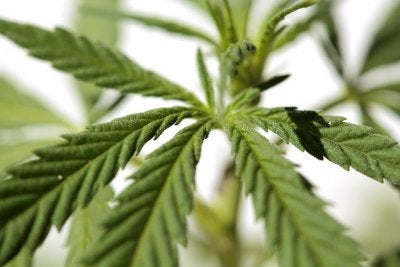-
MD Cannabis Commission Warns Patients That Program Not Operating Yet
IMPORTANT INFORMATION FOR PROSPECTIVE MEDICAL CANNABIS PATIENTS:While progress is being made, there is NO legal medical cannabis available to patients in Maryland. Please read the information below:
- Pre-Awards for Grower, Processor and Dispensaries have been announced, however, no actual final licenses to grow, process or dispense medical cannabis have been issued. The pre-approved entities are currently working through Stage Two of the licensing process, which includes extensive background investigations and regulatory requirements.
- This means there is no legal medical cannabis available to patients in the State of Maryland; written certifications for medical cannabis from physicians are not yet valid in the State of Maryland.
- NO patient identification cards are being issued at this time. The only legal and valid ID cards will be issued by the Commission.
- These cards can only be obtained through the Patient Registry, which will open during the first quarter of next year.
- Patients must first register as a qualifying patient on this website when the Patient Registry opens during the first quarter of next year. The Patient Registry is not yet open.
As a reminder, the process for obtaining legal medical cannabis, once available in the State, can be found here.
-
A Look at Patient Eligibility for Medical Marijuana Access
Medical cannabis in Maryland allows qualifying patients to use medicinal marijuana as part of their treatment plans for a wide number of conditions. If you are considering entering the cannabis business in Maryland, whether through growing marijuana or as a dispensary, understanding and adhering to patient guidelines will be an important part of your operations. Eligibility will also play a large role in determining the size of your customer base. Here is a look at current eligibility guidelines for medical marijuana access.
Maryland Residency
To prevent cross-border transport of medical marijuana originating in Maryland, all patients must be able to prove their Maryland residency. Patients must have either a valid state-issued ID or a photo ID, such as passport, with another piece of identification that proves their residency, such as bank statement or utility bill.
piece of identification that proves their residency, such as bank statement or utility bill. Written Certification from a Doctor
Anyone applying for medical marijuana access must have written documentation from a doctor recommending him or her for alternative medical care. The doctor providing the documentation must be licensed by the state to recommend medical marijuana. Patients are encouraged to obtain this documentation from a provider with whom they have a long-term relationship, if possible. If it is necessary to see a new provider, patients should be able to provide their medication records for review. To receive documentation from a doctor, patients must have a chronic or debilitating condition that requires hospice or palliative care or a chronic or debilitating condition that causes severe pain, severe nausea, seizures, muscle spasms, anorexia, wasting syndrome, or cachexia.Access Card
All patients who seek to purchase medical marijuana must have a state medical card. To obtain a card, patients must submit an application to the appropriate state agency for review and provide all necessary supporting documentation. Once the state has issues a medical marijuana card, patients are then eligible to purchase cannabis from licensed dispensaries. -
Advice for Aspiring Medical Marijuana Cultivators in Maryland
The legalization of medical marijuana in Maryland has led to several new avenues of business opportunities for both dispensaries and growers. People who cultivate marijuana in Maryland for use in medical cannabis businesses must adhere to specific guidelines to remain in compliance with the state’s cannabis laws. Because some of these laws are still in flux and remain under consideration, it is important to work with an attorney with experience in medicinal marijuana law to ensure you stay compliant with all requirements. This advice will help new cultivators entering the field.

Prepare Your Application
All potential growers must submit an application and appropriate fees to the Maryland Medical Cannabis Commission . This application is the first step in being approved as a grower in Maryland, so it is essential that the information provided is thorough and complete. All submitted applications go through a multi-step review process. First, an independent committee reviews all applications and rates them based on how closely they adhere to the guidelines. Next, the Commission votes on pre-approvals to allow growers to progress to the next step, which is setting up a facility. You cannot change your application information once it is submitted, so work with an experienced attorney to ensure you are providing all of the relevant details.Be Aware of Local Jurisdictions
The zoning for growing locations can differ from place to place. The Commission defers to local regulations when approving applications. Not all local zoning codes allow marijuana cultivation in all areas of agricultural production zones. Have a lawyer help you determine if your proposed growing location adheres to local regulations.Create Your Facility in Accordance with Your Application
Before receiving final approval, the Commission will ensure that your cultivating facility is as described in your application. Any differences could delay your final approval. A lawyer can be extremely helpful in ensuring you meet these guidelines and avoid delays. -
A Look at the Fight Against Medical Marijuana in Anne Arundel County
Not everyone supports marijuana legalization in Maryland. In Anne Arundel County, one of the controversies regarding medical cannabis is whether the county can ban legal marijuana in its jurisdiction, despite state-wide legalization. When you watch this video, you’ll hear about County Executive Steve Schuh, who proposed an outright ban on medical cannabis .
Since this news clip aired, however, the County Council and Mr. Schuh have reached a compromise. The bipartisan solution was to enact strict zoning rules that dictate where businesses can legally engage in growing cannabis, processing it, and selling it. The revised bill now includes prohibitions on window displays of cannabis and it restricts cannabis-related businesses from operating within 1,000 feet of schools and homes.
-
What You Need to Know About Medical Marijuana Cultivation Licenses
The process of allowing access to medicinal marijuana in Maryland is slowly moving forward. The Maryland Medical Cannabis Commission accepted applications for licenses for cultivators, processors, and dispensaries up until November 6, 2015. Although you should have already submitted your application if you are interested in growing marijuana , you may still have questions about cultivation licenses. Consider seeking legal counseling to find out about all the latest updates.
Application and License Fees
 All individuals and entities interested in growing marijuana in Maryland should have submitted the required fees along with their applications. The first stage application fee for a prospective marijuana grower is $2,000. All application fees are non-refundable and must be remitted in the form of a money order or cashier’s check.
All individuals and entities interested in growing marijuana in Maryland should have submitted the required fees along with their applications. The first stage application fee for a prospective marijuana grower is $2,000. All application fees are non-refundable and must be remitted in the form of a money order or cashier’s check. Amendments to Submitted Applications
For the most part, it is not possible to amend a cultivation license application that you have already submitted. You may only update information regarding managers, owners, and similar individuals and entities as specified by the Commission’s regulations.Application Approval Process
Medical cannabis regulation in Maryland provides for the approval of a maximum of 15 cultivators’ licenses. It is left to the discretion of the Commission whether to issue fewer than 15 licenses. Now that the submission deadline has passed, an independent review team is already evaluating applications. The team will rank the applications and send the ranking along with a report to the Commission. Then, the Commission will vote on pre-approving the applications.Finalization Process
If your application has been pre-approved, it does not mean that you have a cultivator’s license. You must still obtain zoning and planning approval, begin construction on the location, hire staff, and initiate training procedures. Once your facility is complete, it must pass an inspection. The Commission will also determine whether your facility and production process fulfill the terms of your application and the legal regulations. If so, you may be granted a license to grow medicinal marijuana. You must still take steps to ensure that your cannabis business remains in compliance with all regulations. Otherwise, your license may be rescinded. -
Answers to Patients’ Questions About Medical Marijuana Access
Since the passage of medical cannabis regulation in Maryland, many patients with severe medical conditions have looked forward to being able to control their symptoms with legally obtained medical cannabis. However, regulations regarding medical cannabis continue to evolve and local jurisdictions are still hammering out the details. Medicinal marijuana is not yet available in the state and as of November 2015, the timeline for availability has not yet been finalized. However, if you intend to obtain medical marijuana, it’s a good idea to begin learning about the process.
Do I Have a Qualifying Medical Condition?
Only the prescribing physician can determine this. Generally, qualifying medical conditions are those that are severe and have not responded well to other treatments. Additionally, your medical condition must be reasonably expected to benefit from medicinal marijuana. These qualifying conditions include those that are chronic or debilitating, including glaucoma and post-traumatic stress disorder (PTSD). Qualifying conditions also include those that cause the following problems: Significant loss of appetite, wasting, severe nausea, seizures, severe or chronic pain, or persistent muscle spasms.
Can My Primary Care Physician Issue a Medical Cannabis Card?
Any physician may become qualified to issue a medical cannabis card; it is not necessary to go to a special clinic for an evaluation. You can ask a primary care physician or specialist to register with the Medical Cannabis Commission . Doctors can register if they are licensed in Maryland.What Is the Process for Legally Obtaining Access?
First, you should talk to your doctor to determine whether medical marijuana might help your medical condition. Then, you can register as a patient on the website of the Medical Cannabis Commission. You will need to upload an image of a valid government ID. After you’ve registered, a registered doctor can provide a written certification, which the doctor will record on the Commission’s website. In order to provide patients with a written certification, there must be a bona fide doctor-patient relationship. This means that the prescribing doctor must have examined you, assessed your medical history and medical records, and provided for any necessary follow-up care. -
Medical Marijuana Zoning in Baltimore County
Cannabis laws in Maryland have undergone a significant overhaul in recent years. The legalization of marijuana for medicinal purposes raises new questions for local officials. In Baltimore County, officials decided to take a proactive approach toward marijuana legalization . Councilwoman Vicki Almond of Baltimore County recently spearheaded the effort to implement zoning regulations for medical cannabis.
You can hear about this new legal marijuana regulation by watching this brief news clip. You’ll hear Councilwoman Almond discuss why she thought zoning would be a good idea for growers, manufacturers, and dispensary owners, along with their neighbors. You’ll also learn about the new zoning requirements, including how the potential locations for growing and manufacturing facilities will differ from the acceptable locations for dispensaries.
-
Maryland’s Medical Marijuana Law: The Transition to Dispensaries
Attitudes toward marijuana legalization have been changing slowly but surely in the U.S. The advent of legal marijuana in states such as Colorado has helped lawmakers and activists around the country point to significant benefits for the economy and for patients with chronic medical conditions. While Maryland is one of the latest states to approve the legalization of cannabis for medicinal purposes, the regulations and requirements continue to evolve. Entrepreneurs who are thinking of opening dispensaries in the state would be well advised to seek legal counseling in Maryland.
Long Road to Legalization
Officially, Maryland actually legalized medicinal cannabis in 2013. However, the law was so restrictive that patients were unable to make use of the program. The initial law restricted the dispensing of cannabis to select academic medical centers, or teaching hospitals such as Johns Hopkins University. However, there were no teaching hospitals within the state that were willing to enact such a program. The movement toward marijuana legalization benefited from a complete overhaul of the initial law in 2014. Additional follow-up laws were passed in 2015. However, many prospective cannabis dispensary owners are still waiting for licenses to open up shop.
state that were willing to enact such a program. The movement toward marijuana legalization benefited from a complete overhaul of the initial law in 2014. Additional follow-up laws were passed in 2015. However, many prospective cannabis dispensary owners are still waiting for licenses to open up shop. Mixed Reactions from County Governments
The prospect of having medicinal marijuana dispensaries within their jurisdictions has been cause for concern for some county officials. County Executive Steve Schuh (R) of Anne Arundel County is notable for his extreme reaction to the legalization of cannabis dispensaries. He has proposed a complete ban on both manufacturing facilities and cannabis dispensaries within the jurisdiction. Other county officials; however, including some of Schuh’s fellow Republicans, have welcomed the influx of jobs that dispensaries could bring to their areas. And the Maryland Attorney General’s office recently sent an advisory letter to the state legislature informing lawmakers that counties cannot ban legal businesses , absent special circumstances. If Maryland Senator Robert A. Zirkin (D-Baltimore County) has his way, lawmakers might pass a new law that bans local governments from interfering with patients’ right to access medical marijuana dispensaries. Regardless, by the end of 2016, patients should be able to purchase legal cannabis from 94 dispensaries in Maryland. -
What Doctors Need to Know About Medical Marijuana
If you’re a practicing physician in Maryland, you may have had some patients ask you about medical cannabis and whether you can prescribe it. Since marijuana laws in Maryland are strict regarding which patients can legally use medicinal marijuana, the best way to protect yourself from liability is to consult attorneys who have experience with cannabis laws. If you would like to prescribe medical cannabis, you must first meet the eligibility requirements. You must be licensed to practice medicine in the state of Maryland and you must submit a proposal for each individual patient who wishes to receive medical cannabis.
The proposal you’ll send to the Maryland Medical Cannabis Commission must describe the patient’s qualifying medical condition. Qualifying medical conditions include chronic conditions that result in severe symptoms, such as seizures and significant pain. The proposal must also describe how medical cannabis could help the patient, how you plan to screen the patient for drug dependency, and what your plans are for follow-up care.

-
Highlighting the Benefits of Medical Marijuana
The body of research on medical marijuana continues to grow as more states take steps toward implementing marijuana legalization. If you’re considering forming a business for medical cannabis in Rockville, it’s worth your time to explore the clinical studies and learn about the potential health benefits of the drug.
Cancer
Marijuana has long been touted as a drug that can help ease nausea and vomiting among patients undergoing chemotherapy. This not only improves quality of life for these patients, but it also bolsters their ability to maintain their weight during the treatment. Recently, however, researchers have been focusing their efforts on the use of medical marijuana as an anti-cancer drug, rather than just a medication to alleviate side effects. It has been discovered that cannabis may help stop cancerous tumors from growing by interfering with the expression of a gene that cancer cells need to spread. Researchers conducting similar studies have concluded that cannabis may even induce cancer cell death.
need to spread. Researchers conducting similar studies have concluded that cannabis may even induce cancer cell death. Seizures
Many patients have consulted an attorney about cannabis laws because they’re interested in using medical marijuana to control seizure disorders. For years, researchers have known that cannabinoids attach to certain receptors in the brain, which results in the reduction of seizure episodes in epilepsy patients. Cannabis is also known to manage the symptoms of Dravet’s syndrome, which causes developmental delays along with seizures.Lung Capacity
Some opponents of medical marijuana argue against legalization laws because they believe it will only result in increasing cases of lung problems. In fact, research demonstrates that the opposite effect occurs. One study found that although people who smoke cigarettes have a decrease in lung capacity, those who smoke marijuana have an increase in lung capacity over time.Anxiety
Anxiety is one of the most common mental health disorders. Although there are medications available to treat it, these can be habit-forming and they may cause adverse side effects. Medical marijuana may be one option for people who suffer from generalized anxiety disorder (GAD) and other anxiety disorders.

